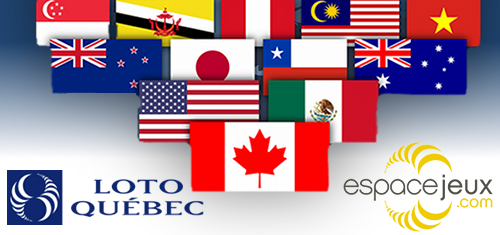 Loto-Quebec’s online gambling site is on track to smash its previous revenue record following another quarter of double-digit growth.
Loto-Quebec’s online gambling site is on track to smash its previous revenue record following another quarter of double-digit growth.
The Canadian province’s gambling monopoly reported a one-third rise in revenue at its Espacejeux online division in the first nine months of its 2015-16 fiscal year. Espacejeux revenue is up 33.2% to C$46.2m (US $34.4m), only $2.7m less than the sum earned during the full 2014-15 fiscal year.
Sadly, that’s the extent to which Loto-Quebec details its online operations, outside of saying its database of registered customers is growing larger every week (now believed to total around 16k). Informative, huh? There’s just nothing like the kind of public accountability one gets from a publicly funded monopoly.
Loto-Quebec credited the rise to a “significant improvement” to its online offering. The monopoly announced a boost in betting payout percentages at its Mise-o-jeu online and mobile parlay sports betting operation in December. Mise-o-jeu also recently announced it was taking prop wagers on the US presidential election, following the lead of other provincial monopoly sites.
The online growth significantly outpaced the rise in Loto-Quebec’s overall revenue, which gained 6.5% to $2.65b in the first nine months of the 2015-16 year. Profits were up 12.1% to $945.8m, putting the monopoly on track to exceed its annual target of $1.15b.
Loto-Quebec’s mainstay lottery operations reported sales up 11.4% while net income rose 28.2% to $358m. Casino revenue improved by 2.1%, boosting profits by 9.3% to $155.4m.
Other land-based gaming establishments reported profit up 2.4% to $432.5m, although the individual components reported mixed results. Game room revenue was up 44% and bingo halls rose nearly one-third while video lottery terminal revenue fell 0.8%.
COULD TPP SPELL DOOM FOR IP-BLOCKING PLANS?
Meanwhile, Quebec continues to forge ahead with its constitutionally sketchy plans to require internet service providers to IP-block online operators not named Espacejeux (with a possible carveout for sites linked to Montreal’s Amaya Gaming). Omnibus Bill 74, which contains the IP-blocking provision, was debated again in the provincial legislature last month and appears well on its way to becoming law.
Finance Minister Carlos Leitao has said he expects the IP-blocking will boost Espace-jeux’s annual revenue by $13.5m in its first year, rising to $27m in future years. It could also boost the provincial government’s revenue via fines issued to ISPs who defy the government’s censorship demands — $100k for initial transgressions, twice that sum for repeat offenders.
But University of Ottawa law professor and internet freedom advocate Michael Geist is warning that Canada’s involvement in the Trans Pacific Partnership (TPP) may throw a wrench into Quebec’s plans to restrict access to international gambling sites.
Several TPP signatories have specifically included gambling on the list of services that countries can shield from foreign competition (in the guise of consumer safety). But since gambling is a provincial matter in Canada, federal negotiators declined to push for this exception, opting instead to include “all existing non-conforming measures” of provinces, which doesn’t include the yet-to-be-passed Bill 74.
Regardless, Geist suggested that Quebec would have a hard time sneaking Bill 74’s gambling provisions past the TPP competition watchdogs, particularly since Leitao expressly framed the measure as a protectionist bid to boost Loto-Quebec’s revenue, until realizing that framing it as a ‘public health’ issue offered better legal cover. In the long run, the TPP could prove problematic for other provinces that attempt to restrict the rights of their residents to access gambling sites based in other TPP countries.






